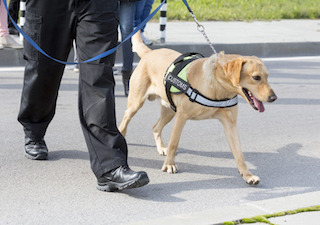
In popular culture, there are countless representations of police dogs sniffs that lead to the discovery of illegal drugs, bombs, or other contraband. The police dogs are almost always portrayed as heroes in these storylines, helping the good buys fight back against the bad guys. There is rarely any exploration of rights and duties involved with police dog sniffs.
In practice, there are guidelines in place concerning the legality of and restrictions on dog sniffs. The reason is simple. The Fourth Amendment protects everyone in the United States from unreasonable search and seizure. As police dog sniffs generally involve search and seizure, there are limitations in place to protect constitutional rights.
In order to gain a full appreciation of the legality of police dog sniffs, the following sections will examine two important and related decisions from the United States Supreme Court.
Scope of Legal Traffic Stops
The Supreme Court stated in Illinois v. Caballes, 543 U.S. 405 (2005) that a traffic stop is a form of search and seizure governed by the Fourth Amendment. When a police officer stops a car on the road, the Fourth Amendment imposes a restriction scope and length of the stop.
As the Supreme Court explained, the scope of a legal traffic stop includes four major aspects:
- Verification of the driver’s license;
- Inspection of computer database for outstanding warrants;
- Examination of vehicle registration; and
- Confirmation of valid liability insurance.
The Supreme Court elaborated that the length of a traffic stop should be reasonably related to the amount of time needed to complete the tasks above. Overall, the traffic stop should not last significantly longer than necessary to complete the tasks above.
Restrictions on Prolonged Traffic Stops
The Supreme Court highlighted in Arizona v. Johnson, 555 U.S. 323 (2009) that prolonged traffic stops are allowed in certain circumstances. In such situations, police officers are allowed to investigate matters unrelated to the list above. But police officers are not allowed to extend the traffic stop measurably or significantly.
If a police officer extends an otherwise legal traffic stop beyond a reasonable amount of time, then Fourth Amendment protections kick in. At that point, the entire traffic stop may become unlawful. All evidence collected could be tossed out.
Legality of Police Dog Sniffs During Traffic Stops
The Supreme Court decisions in Caballes and Johnson make it clear that lawful traffic stops are limited in scope and time. Police officers do not have much extra time to conduct activities unrelated to the driver’s license, outstanding warrants, vehicle registration and proof of insurance. Moreover, police officers must conduct any unrelated inquiries in an efficient manner, without drastically increasing the length of the traffic stop.
Police dog sniffs are not related to the normal scope of a lawful traffic stop. This means that police dog sniffs must occur in an efficient manner, without significant increase to the length of the traffic stop. If police dog sniffs unreasonably extend the length of a traffic stop, all evidence collected may be tainted and unavailable in court. So if a police officer making the traffic stop has a dog with him, it is likely going to be a permissible dog sniff. However, if a police officer unnecessarily detains a driver for an extended period of time for another K9 Unit to arrive, the more likely a court will determine the stop was prolonged beyond its intended purpose.
Attacking the “Alert” From the Drug Dog
There are many ways to challenge a drug case that started with a traffic stop. The first would be to challenge the initial traffic stop and determine whether there was grounds for the stop. The next challenge would be to the length of the detention and whether the driver was held beyond the time required for the stop. If neither of those are successful, then the alert of the drug dog must be challenged. Some issues are:
- Whether or not the police officer was sufficiently trained in narcotics detection
- Whether or not the dog has received proper training
- Was the training program adequate or are its methods faulty or unproven
- What is the history of the handler or the dog’s history on drug detection
Contact a Proficient Illinois Criminal Lawyer for Assistance
If you were subjected to a police dog sniff during a traffic stop, a proficient Illinois criminal lawyer can help you examine and challenge the evidence presented against you. Featuring two office locations in Illinois, Sami Azhari has demonstrated proficiency handling a wide variety of criminal defense cases, including those involving police dog sniffs. If you need legal assistance, contact Sami Azhari today to get started.